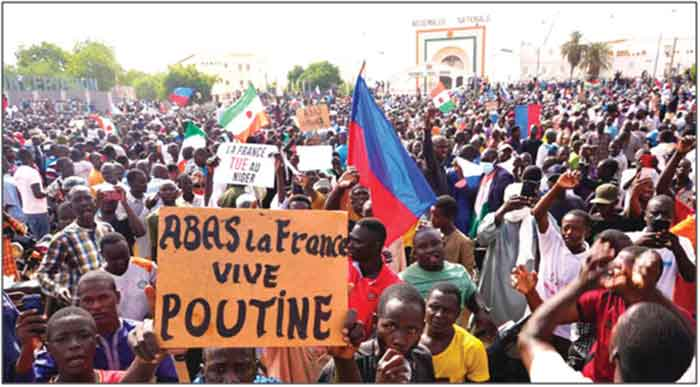France will pull its military and diplomats from Niger after a successful coup by anti-French forces, President Emmanuel Macron said on Sunday. The move will see around 1,500 soldiers leave by the end of the year.
According to media reports, “France has decided to withdraw its ambassador. In the next hours our ambassador and several diplomats will return to France, and we will put an end to our military cooperation with the Niger authorities, Macron told France 2 television on Sunday.
Macron said that French troops would return home in “the months to come.”
Niger’s pro-French president, Mohamed Bazoum, was ousted in a military coup in July. Capitalizing on widespread public dissatisfaction with France’s decade-long anti-insurgent operation in the region, the coup leaders immediately suspended a military cooperation agreement with the French government and demanded that French troops leave the country.
The military leaders of Niger then demanded in August that French ambassador Sylvain Itte leave, revoking his diplomatic immunity when Paris refused. Last week, Macron claimed that the Nigerian military was holding Itte “hostage” by blocking food deliveries to the French embassy.
Around 1,500 French soldiers are currently based in Niger, after Paris suspended military operations in Mali and Burkina Faso following similar coups d’etat in both countries. The French base in Niger was one of the largest in the Sahel region, and when the withdrawal is complete, only several dozen French troops will remain in Chad.
With French influence waning, Niger, Mali, and Burkina Faso announced the formation of a military alliance last week. Mali and Burkina Faso both informally committed to backing Niger in the event of an invasion by the regional ECOWAS bloc after the coup, and the signing of the defense pact formalizes this agreement.
Malian Defense Minister Abdoulaye Diop told Reuters that the Alliance of Sahel States, as the three-nation bloc will be known, will also work together to fight terrorism and secure their shared borders.
Despite acquiescing to the coup plotters’ demands, Macron insisted that France continues to recognize Bazoum as Niger’s “sole legitimate authority.”
Sanctions Create Drug Shortages In Niger
Citing a Nigerien Ministry of Health official an earlier report said:
Niger is facing a critical shortage of medicines as a result of sanctions imposed by the West African regional authority, ECOWAS, in response to a coup in July.
Ibrahim Sule, secretary general of the African country’s health ministry, told that Niger is running low on antibiotics, as well as cancer, diabetes, and cardiovascular disease treatment drugs.
“Pharmaceutical products destined for Niger are delayed at the port of Cotonou in Benin or at the border, and more than 60 blocked containers have been found there. These are worth about 4 billion CFA francs ($1.6 million), the media report quotes Sule as saying.
The military government in Niger has been under Economic Community of West African States (ECOWAS) sanctions since soldiers of the presidential guard deposed President Emmanuel Bazoum on July 26.
The regional bloc restricted financial transactions and closed entry into the uranium-rich nation from its other member states to pressure the coup plotters to restore democratic order.
Last month, thousands of trucks carrying food bound for the West African country were reported to have been stranded for weeks at the Malanville crossing in northern Benin due to border closures.
The UN food agency, the World Food Programme (WFP), had previously warned that the blockade was “greatly” affecting the supply of “vital” foods and medical supplies into Niger.
Djaounsede Madjiangar, the West African regional spokesperson for the WFP, claimed that about 6,000 tonnes of goods from the agency, including food for malnourished children, were stuck outside the capital Niamey.

